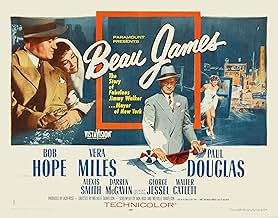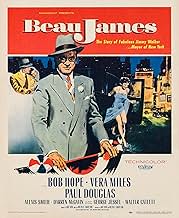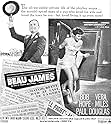Biopic of the political career of Jimmy Walker, flamboyant and somewhat corrupt Mayor of New York City from 1926-1932.Biopic of the political career of Jimmy Walker, flamboyant and somewhat corrupt Mayor of New York City from 1926-1932.Biopic of the political career of Jimmy Walker, flamboyant and somewhat corrupt Mayor of New York City from 1926-1932.
- Director
- Writers
- Stars
Eric Alden
- Reporter
- (uncredited)
Babette Bain
- Puerto Rican Child
- (uncredited)
Russ Bender
- Reporter
- (uncredited)
Jack Benny
- Jack Benny
- (uncredited)
John Benson
- Photographer
- (uncredited)
- Director
- Writers
- All cast & crew
- Production, box office & more at IMDbPro
Featured reviews
Having watched this movie many times -- it's in my library, I firmly believe that the role could only have been played by Bob Hope. To my mind, this is his best performance. That coupled with an excellent cast, highlighted by the duet with Jimmy Durante (and Jack Benny's cameo) make this a thoroughly enjoyable movie to watch -- just for fun. >
Based on the charmingly cleaned up biography of a minor but colorful figure in New York history, sometime songwriter/Mayor James J. ("Gentleman Jimmy") Walker, this unjustly neglected Paramount film was a healthy success in its day but has not (as of this writing) been made available on DVD despite an outstanding cast and ties to truly remarkable figures in entertainment and history. One of Bob Hope's warmest, most thoughtful performances, it should be rescued from the occasional "fool screen" broadcast and made available in a good VistaVision release reflecting the original.
The no less fictionalized musical biography of Walker's successor as Mayor of New York, Fiorello H. LaGuardia (the sadly unfilmed FIORELLO), won a Pulitzer Prize and tied with THE SOUND OF MUSIC for the Tony as Best Musical of 1959, but Fowler's biography of Walker with Hope in the lead (looking nothing like Walker, but beautifully capturing Fowler's idea of Walker's character) was as good as it got for Gentleman Jimmy - the less well cast 1969 musical (JIMMY, inflicted on Broadway by movie mogul Jack L. Warner) suggested by the same book but with far less skilled hands writing (BEAU JAMES' director, Melville Shavelson was one of the writers) died a painful death in just over two months (October 23, 1969-January 3, 1970, at the Winter Garden Theatre after a tryout at Philadelphia's Forrest Theatre; a long out-of-print Broadway Cast Album of the enjoyable but uneven score on RCA LSO 1162 is all that survives.) In the movie, the glamorous Alexis Smith (Tony Award, Best Actress in a Musical for 1971's FOLLIES) furthered her reputation as Hollywood ice princess as Walker's unappreciated but sympathetic wife, Allie, and had to work hard to allow audiences to believe that Bob Hope's finely layered but (on screen anyway) naive Walker would leave *her* for Vera Miles higher billed chorus girl, Betty Compton.
The film does make New York at the end of the "Roaring Twenties" almost a co-equal character in the piece, and appearances of several real life characters from the era (Jimmy Durante, Jack Benny and others) add to the impression beautifully - as does the deft narration from Fowler's book appropriately read by Walter Winchell.
It isn't great history or even great Hollywood, but it is a very warm, enjoyable film well worth a look - and a great example of how "bad" casting (Hope's lack of *physical* resemblance to Walker) can be brilliant if it gets the *psychology* right. When they tried to musicalize the idea a decade later, the production was probably dead the moment they cast the skinny impressionist/actor Frank Gorshin (who actually did bear a passing resemblance to Walker) in the Hope role. All the qualities Gene Fowler infused in his book (to MAKE the reader and later, viewer of the movie, feel "warm and forgiving all day long") disappeared. The movie understood this - and you will.
The no less fictionalized musical biography of Walker's successor as Mayor of New York, Fiorello H. LaGuardia (the sadly unfilmed FIORELLO), won a Pulitzer Prize and tied with THE SOUND OF MUSIC for the Tony as Best Musical of 1959, but Fowler's biography of Walker with Hope in the lead (looking nothing like Walker, but beautifully capturing Fowler's idea of Walker's character) was as good as it got for Gentleman Jimmy - the less well cast 1969 musical (JIMMY, inflicted on Broadway by movie mogul Jack L. Warner) suggested by the same book but with far less skilled hands writing (BEAU JAMES' director, Melville Shavelson was one of the writers) died a painful death in just over two months (October 23, 1969-January 3, 1970, at the Winter Garden Theatre after a tryout at Philadelphia's Forrest Theatre; a long out-of-print Broadway Cast Album of the enjoyable but uneven score on RCA LSO 1162 is all that survives.) In the movie, the glamorous Alexis Smith (Tony Award, Best Actress in a Musical for 1971's FOLLIES) furthered her reputation as Hollywood ice princess as Walker's unappreciated but sympathetic wife, Allie, and had to work hard to allow audiences to believe that Bob Hope's finely layered but (on screen anyway) naive Walker would leave *her* for Vera Miles higher billed chorus girl, Betty Compton.
The film does make New York at the end of the "Roaring Twenties" almost a co-equal character in the piece, and appearances of several real life characters from the era (Jimmy Durante, Jack Benny and others) add to the impression beautifully - as does the deft narration from Fowler's book appropriately read by Walter Winchell.
It isn't great history or even great Hollywood, but it is a very warm, enjoyable film well worth a look - and a great example of how "bad" casting (Hope's lack of *physical* resemblance to Walker) can be brilliant if it gets the *psychology* right. When they tried to musicalize the idea a decade later, the production was probably dead the moment they cast the skinny impressionist/actor Frank Gorshin (who actually did bear a passing resemblance to Walker) in the Hope role. All the qualities Gene Fowler infused in his book (to MAKE the reader and later, viewer of the movie, feel "warm and forgiving all day long") disappeared. The movie understood this - and you will.
I believe it was Walter Winchell who coined that nickname for James J. Walker, Mayor of New York from 1926 to 1932 and the subject of this biographical film starring Bob Hope. It was Hope's last stab at a serious dramatic part. While he does well in it, Hope never tried as serious a role again in his career.
Jimmy Walker was the Majority leader of the State Senate and was the personal choice of Governor Alfred E. Smith to be Mayor of New York. Then as now, Republican mayors of New York City were a rarity, the Democratic nomination was sufficient guarantee to be elected.
Al Smith had dreams of being the Democratic presidential candidate. He almost was in 1924, but could not get past William Gibbs McAdoo that year in the famous 103 ballot convention that eventually turned to compromise dark horse candidate John W. Davis who went down in November to Calvin Coolidge. Smith wanted to secure his home base, but the mayoralty of New York and the patronage of the office was controlled by Smith's arch enemy, publisher William Randolph Hearst and his stooge Mayor John F. Hylan. Smith ran Walker in the 1925 primary and beat Hylan and then Walker handily won the General Election.
Smith knew Walker was a lightweight and he took the unusual step of having a gubernatorial office put in City Hall where he would be at least once a week, keeping tabs on Jimmy. Smith became the Democratic presidential candidate in 1928 and lost to Herbert Hoover. No longer governor, Smith was not around to keep Walker on a short leash. That's when he got into trouble.
Walker was a colorful figure during Prohibition. He and Smith were both unalterably opposed to the idea and Smith even served notice that the law enforcement arm of New York State would not be wasting its time on policing the drinking habits of New Yorkers. Walker got the nickname the Night Mayor of New York because as often as not he'd sleep all day and be partying all night at the famous Central Park Casino.
It was there that Walker met showgirl and began a long term affair with her. His marriage to his wife Allie was long over, but for appearance's sake, for the millions of Catholic voters in New York he kept the facade up.
Times have certainly changed. We now have a former Mayor of New York, named Rudolph Giuliani running for president with three marriages to his credit and a nasty divorce that got spread out in the tabloids.
Nobody ever mentioned Walker and president in the same breath. It was trouble enough to keep him paying attention to his job as mayor. The cronies he had from Tammany Hall ran wild, especially when Smith was no longer governor to keep them and him in line. During the boom times of the Twenties, people laughed at his colorful antics, but come the Depression and the stories of graft became routine newspaper stories, public opinion turned against Walker overnight.
Bob Hope made a fine Jimmy Walker and the two women in his life, Vera Miles as Betty and Alexis Smith as Allie give him good support. In one of his last films, Walter Catlett makes a brief appearance as Alfred E. Smith, and the rest of the cast is headed by Paul Douglas as a Tammany boss and Darren McGavin as Charles Hand, Walker's press secretary and conscience.
Beau James is a colorful account of a colorful era. It certainly as a film version of his life one that Jimmy Walker would have approved of.
Jimmy Walker was the Majority leader of the State Senate and was the personal choice of Governor Alfred E. Smith to be Mayor of New York. Then as now, Republican mayors of New York City were a rarity, the Democratic nomination was sufficient guarantee to be elected.
Al Smith had dreams of being the Democratic presidential candidate. He almost was in 1924, but could not get past William Gibbs McAdoo that year in the famous 103 ballot convention that eventually turned to compromise dark horse candidate John W. Davis who went down in November to Calvin Coolidge. Smith wanted to secure his home base, but the mayoralty of New York and the patronage of the office was controlled by Smith's arch enemy, publisher William Randolph Hearst and his stooge Mayor John F. Hylan. Smith ran Walker in the 1925 primary and beat Hylan and then Walker handily won the General Election.
Smith knew Walker was a lightweight and he took the unusual step of having a gubernatorial office put in City Hall where he would be at least once a week, keeping tabs on Jimmy. Smith became the Democratic presidential candidate in 1928 and lost to Herbert Hoover. No longer governor, Smith was not around to keep Walker on a short leash. That's when he got into trouble.
Walker was a colorful figure during Prohibition. He and Smith were both unalterably opposed to the idea and Smith even served notice that the law enforcement arm of New York State would not be wasting its time on policing the drinking habits of New Yorkers. Walker got the nickname the Night Mayor of New York because as often as not he'd sleep all day and be partying all night at the famous Central Park Casino.
It was there that Walker met showgirl and began a long term affair with her. His marriage to his wife Allie was long over, but for appearance's sake, for the millions of Catholic voters in New York he kept the facade up.
Times have certainly changed. We now have a former Mayor of New York, named Rudolph Giuliani running for president with three marriages to his credit and a nasty divorce that got spread out in the tabloids.
Nobody ever mentioned Walker and president in the same breath. It was trouble enough to keep him paying attention to his job as mayor. The cronies he had from Tammany Hall ran wild, especially when Smith was no longer governor to keep them and him in line. During the boom times of the Twenties, people laughed at his colorful antics, but come the Depression and the stories of graft became routine newspaper stories, public opinion turned against Walker overnight.
Bob Hope made a fine Jimmy Walker and the two women in his life, Vera Miles as Betty and Alexis Smith as Allie give him good support. In one of his last films, Walter Catlett makes a brief appearance as Alfred E. Smith, and the rest of the cast is headed by Paul Douglas as a Tammany boss and Darren McGavin as Charles Hand, Walker's press secretary and conscience.
Beau James is a colorful account of a colorful era. It certainly as a film version of his life one that Jimmy Walker would have approved of.
Bob Hope turned in a great performance as N.Y. Mayor James Walker in this 1957 film.
While the film did not delve into the exact intricacies of the corruption of the Walker Administration, we do have Judge Seabury heading the investigation prompted by Gov. Roosevelt, who wanted that nomination in 1932 and would use Walker's alleged corruption to get it.
Remember the song- the little tin box? That best describes what was going on when Walker, a really decent not-too bright guy, let corrupt officials run the show at City Hall.
Adored by the people at first,(Will You Remember Me in December is sung with zest), he can't accept the booing he encounters at a baseball game, once the corruption details start coming out.
Adding fuel to the fire is Walker's abandonment of his wife for actress Betty Compton, played by Vera Miles. Walker eventually resigned and went with Compton to Mexico.
While the film did not delve into the exact intricacies of the corruption of the Walker Administration, we do have Judge Seabury heading the investigation prompted by Gov. Roosevelt, who wanted that nomination in 1932 and would use Walker's alleged corruption to get it.
Remember the song- the little tin box? That best describes what was going on when Walker, a really decent not-too bright guy, let corrupt officials run the show at City Hall.
Adored by the people at first,(Will You Remember Me in December is sung with zest), he can't accept the booing he encounters at a baseball game, once the corruption details start coming out.
Adding fuel to the fire is Walker's abandonment of his wife for actress Betty Compton, played by Vera Miles. Walker eventually resigned and went with Compton to Mexico.
This is the closest thing to a good dramatic performance Bob Hope ever gave...and its pretty good. Of course, the film soft pedals and simplifies: Walkers great antagonists, Seabury and LaGuardia, barely appear in it. In fact, there is a great dramatic and tragic film waiting to be made of the Jimmy Walker story, with terrific roles for the actors who would portray the "little flower' LaGuardia, and the incorruptible, if cold -hearted, "man who rode the Tiger", Seabury, as well as Jimmy Walker ( not to mention his wife and mistress). Maybe Scorsese could do it someday.
Did you know
- GoofsMayor Walker is in a parade near movie's end. In the background is a 1955 or 1956 Cadillac.
- Quotes
Mayor James J. 'Jimmy' Walker: Goodbye... but remember this: the voters always get what they deserve. I wasn't the only chump in this city. It took a lot of you to elect me.
- ConnectionsFollows Yankee Doodle Dandy (1942)
- How long is Beau James?Powered by Alexa
Details
- Release date
- Country of origin
- Languages
- Also known as
- Schöne Frauen, harte Dollars
- Filming locations
- Production companies
- See more company credits at IMDbPro
Box office
- Gross US & Canada
- $1,750,000
- Runtime
- 1h 45m(105 min)
- Aspect ratio
- 1.85 : 1
Contribute to this page
Suggest an edit or add missing content







































